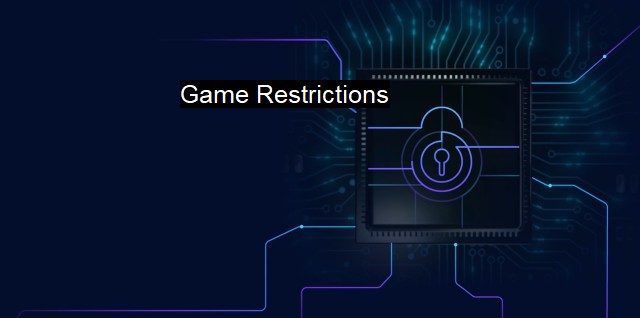What are Game Restrictions?
The Importance of Game Restrictions in Cybersecurity and Antivirus Protection: Ensuring Safe and Secure Online Gaming Environments for Users of All Ages
Game restrictions primarily refers to the measures implemented by software developers, cybersecurity experts, and antivirus providers to prevent unauthorized access, reduce vulnerabilities, and ensure secure gameplay experience. This brings into focus three main interconnected constituents; cybersecurity, which is fundamentally about protecting internet-connected systems; antivirus, which is dedicated to preventing, detecting, and removing malicious software; and game restrictions, which is about limiting specific behavior within the sphere of gameplay for distinct security purposes or enhanced gameplay experience.One of the crucial aspects of game restrictions is based on the age classification system. This helps to protect younger players from inappropriate content. These restrictions can also limit features such as in-game purchases or restrict online functionality to avoid contact with unknown parties over the network. All this is executed with an underlying aim to control hornets of cybersecurity issues such as online exploitation, sharing of sensitive personal data, contact with pedophiles, and exposure to offensive language.
Game restrictions can also influence the severity and the potential ethnocentric impacts of cyber threats in the gaming community. In today’s world, online games are not just recreational activities but also platforms for cybercriminals due to the significant data flow occurring in these ecosystems. Game restriction can often mean implementing stringent measures such as two-factor authentication to ensure the integrity of user accounts. The restriction can also mean blocking taking certain forbidden actions in the game deemed as cheating, made possible by exploiting security vulnerabilities or using malicious software.
From the perspective of cybersecurity, these malicious activities can result in compromising unaware users' devices, affirming the necessity for antivirus solutions. Antivirus software acts as the first line of defense, scanning for and removing malicious software and known threats. What makes applying antiviruses even more prevalent in the gaming world is their ability to function efficiently without hindering gameplay experience facilitating the essential lower latency gaming environment favored by gamers.
It's worth mentioning that the role of antiviruses is limited in preventing intentional cheating in games. The responsibility of diminishing in-game cheating often relies heavily on game developers executing adequate game restrictions effectively. These game restrictions can mean implementing proprietary anti-cheat software that prevents users from introducing in-game advantages through code modifications, bots, or third-party applications.
Game restrictions may also entail the regulation of content creation and modification by the game players–often referred to as 'modding'. Modding refers to the alteration of game content and mechanics by players. While modding in itself is not necessarily negative and can contribute to the vibrancy of a game community, it does open a potential vector for cyber threats. Modding could be used as a vehicle to deliver and distribute malicious contents if not thoroughly subjected to game restrictions and security checks.
By limiting certain behaviors or permissions, game companies, cybersecurity experts, and antivirus software can work together to provide a safer gaming environment for users. As games continue to evolve and online interactions increase, the need for comprehensive game restrictions, powered by robust cybersecurity systems and effective antivirus solutions, will become even more critical. Whether it's age-appropriate content filters, restrictions on in-game purchases, implementing proprietary anti-cheat mechanisms, or regulating content modification, game restriction helps maintain the integrity and safety of the gameplay experience in the midst of evolving cyber threats.
Conclusively, game restrictions remain pivotal in safeguarding interests of the diverse gaming community and preserving the sanctity, fairness, and enjoyment of these platforms while concurrently presenting a strong, security vigilance against an array of cyber threats.

Game Restrictions FAQs
What are game restrictions?
Game restrictions refer to limitations imposed on video games to prevent them from accessing certain resources on a computer system. These restrictions are often put in place for cybersecurity and antivirus purposes.Why are game restrictions important for cybersecurity?
Game restrictions are important for cybersecurity because they prevent games from accessing sensitive resources on a computer system that could be used to compromise its security. By placing restrictions on games, it limits the potential attack surface and helps keep the system secure.What kinds of restrictions might be placed on games for cybersecurity purposes?
Some examples of game restrictions that might be used for cybersecurity purposes include limiting network access, preventing files from being written or modified, and blocking access to certain system resources. These restrictions can help prevent malware and other threats from infecting a system through a game.Does every game have restrictions for cybersecurity purposes?
No, not every game has restrictions for cybersecurity purposes. It depends on the game and the systems it is being played on. However, it is becoming increasingly common for games to have some level of restrictions in place to help prevent security breaches.| | A | | | B | | | C | | | D | | | E | | | F | | | G | | | H | | | I | | | J | | | K | | | L | | | M | |
| | N | | | O | | | P | | | Q | | | R | | | S | | | T | | | U | | | V | | | W | | | X | | | Y | | | Z | |
| | 1 | | | 2 | | | 3 | | | 4 | | | 7 | | | 8 | | |||||||